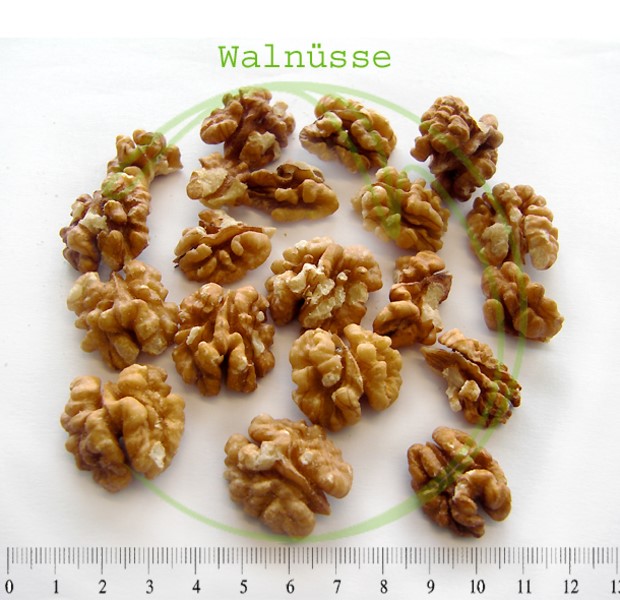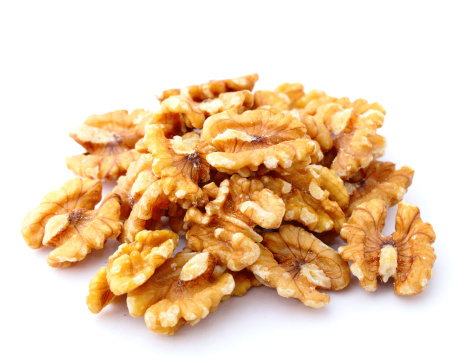
WALNUT OIL
Oil production
Walnut oil is taken from walnut kernels that have a fat content over 60% after being dried. The oil can be obtained through cold-pressing, hot-pressing, or chemical extraction. However, cold-pressed and subsequently filtered walnut oil has the best quality. Oils of simple quality (oil from extraction or hot-pressing) are usually also refined afterward in order to remove some of the bitter substances. First, the nuts are loosed from their outer shells and dried. In order to yield a richly aromatic and flavorful oil later, the walnuts are sometimes briefly roasted before being pressed. For a cold-pressing, the nut kernels are carefully – without heat input – fed into a screw press and de-oiled. Then the oil is filtered in multiple steps to remove the lees and turbidity constituents. For a hot-pressing, the oil is obtained only after a considerable heat input. A hot-pressing then ensues mechanically with a screw press. Afterward, it is refined of undesirable substances. The final product is an oil relatively neutral in odor and taste, yet which has a long shelf life. The oil can also be removed from the walnuts through a chemical extraction using organic solvents. The solvent is subsequently removed in a second heating, after which the oil undergoes a refining process.
We will be happy to advise you on this seed and show you options. Contact us.
Characteristics and shelf life
Walnut oil comes in various colors ranging from light yellow to greenish yellow to light brown. It smells pleasant and light, and also possesses a walnut note. Its taste is described as pleasing, intense and nutty. This oil is relatively fluid. Its flash point is between -29 to -28° C and its smoke point is about (120°C -) 160° C. The flash point of refined oil is very high, around 326° C. Walnut oil distinguishes itself through a very high unsaturated fatty acid content. It contains about 20% monounsaturated fatty acids; ca. 62% double unsaturated fatty acids; and about 9% triple unsaturated fatty acids. Thus, due to its high content of omega-6 fatty acid γ-linoleic acid and omega-3 fatty acid α-linolenic acid, walnut oil represents a good source of fatty acids essential in human nutrition. Also beneficial is the low percentage of saturated fatty acids. Besides these, the oil also contains lecithin, vitamin B (which supports important brain functions, protects nerve cells, and prevents irritability and poor concentration), and much vitamin E. What is more, the oil contains polyphenols, selenium, copper, Zinc, magnesium and provitamin A, the last of which is important for regular growth and healthy eyesight.
Walnut oil has a shelf life of 9 to 12 months if it kept in a sealed container in a cooled, dark location.
Use
Pharmaceutical and medical use
Walnut oil plays an important role here. One benefit of walnut oil is that it consists of a high mono- and polyunsaturated fatty acid content, which in addition to the oleic and linolenic acids, also particularly contains linoleic acid (an omega-6 fatty acid). For this reason, this oil can be considered a dietary cooking oil. According to the Lexikon der pflanzlichen Fette und Öle (Lexicon of plant fats and oils), this oil can lower both triglyceride and cholesterol levels; reduce the risk of arteriosclerosis; and also have a beneficial effect on the metabolism of lipids. Walnut oil features further positive characteristics, such as being a thorough disinfectant (important in skin care, for example) and fungicide (anti-fungal substance). These qualities make it an ideal basis for healing ointments, whereby it can support the main active ingredients and contribute to a successful healing of fungal infections, decubitus, or other open wounds. Additional positive effects of walnut oil are quoted from Günter A. Ulmer in his book Heilende Öle (healing oils). Thus, this oil is supposed to promote fat metabolism, lower cholesterol levels, stimulate the metabolism, activate hormonal balance, and support skin regeneration. Further benefits of walnut oil are that, when consumed regularly, it can strengthen the immune system and enhance physical and mental performance. It also helps lower blood pressure and can strengthen the heart and circulatory system, thereby preventing cardiac and circulatory problems.
In folk medicine
Even here walnut oil is used, which is probably ascribed to its fungicidal and disinfectant properties. In this capacity it is used to treat liver and gallbladder ailments; metabolic disorders; anal itching; bee stings; and athlete’s foot. Moreover, it is used for respiratory diseases, warts, ruptures at the corner of the mouth, lip herpes, corns, and skin irritations.
Cosmetic use
Although walnut oil is counted among the very greasy oils, it is nevertheless absorbed quickly into the skin. For this reason, it is readily used in cosmetic products, for example, in hair shampoos, in moisturizing shower gels, and as a basis for ointments and creams. It is supposed to help against skin irritations and also promote hair regeneration. Juglandis nucum infusum, the oily product resulting from an infusion the shells of green, unripe walnuts, which contain hydrojuglone, is often mixed into skin tanning lotions and sun protection lotions. Chapped lips can be treated with pure walnut oil instead of lip salve.
Technical use
There are even a few technical applications known for walnut oil. Thus, it can serve a wood impregnation and in soap production. Furthermore, it can also be used as a dispersing agent for artist’s paints and is used particularly in oil paints. The advantages of walnut oil are that it is thin, takes up pigment readily, dries quickly, and distinguishes itself by lending the surface a glossy shine with only marginal yellowing.
In the kitchen
Among the various nut oils, walnut oil is considered especially valuable oil because it alone features a very high percentage of polyunsaturated fatty acids. It is also commonly appreciated as a delicacy, especially in French cuisine. For example, it is used to refine dips, sauces, salads and cooked vegetables; as well as in desserts, with fruit salad, or together with vanilla ice cream. Likewise dishes such as asparagus, celery, carrots, legumes, or fish, rice, and game can be complemented with walnut oil. Thanks to its well-balanced fat ratio, the high omega-3 fatty acid content, and the high amounts of vitamins and plant substances, this oil is ranked as one of the healthiest. Yet owing to its high percentage of unsaturated fatty acids and its low smoke point, it should not be heated to high temperatures, otherwise the many healthy contents will be destroyed.
In addition to their own knowledge acquired through press trials, the following sources were used to create the article:
- Öle, natürlich kaltgepresst, Basiswissen & Rezepte, Marcus Hartmann, Hädecke, 2008
- Heilende Öle, Pflanzenöle als Nahrungs- und Heilmittel, Neue Erkenntnisse, Günter Albert Ulmer Verlag Tuningen
- Lexikon der pflanzlichen Fette und Öle, Krist, Buchbauer, Klausberger, SpringerWienNewYork, 2008
- www.wikipedia.de
- en.wikipedia.org

